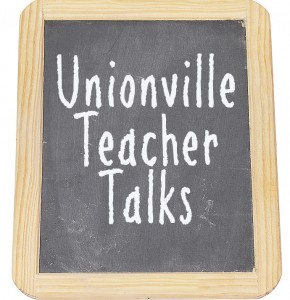Board to offer its side of negotiations at Tuesday night’s meeting
By Mike McGann, Editor, UnionvilleTimes.com
 EAST MARLBOROUGH — New year, new approach.
EAST MARLBOROUGH — New year, new approach.
The Unionville-Chadds Ford Board of Education has decided to take a more public stance relative to the ongoing negotiations with its teachers union and plans to offer a full report, Tuesday, on the state of the negotiations, seemingly currently on hold as a state mediator looks at both sides’ proposals.
Based on comments during Monday night’s work session, it appears that the board will be laying out the numbers and what they see as the potential for hurting the school district’s ability to educate students if they were to go along with the current teachers’ proposals.
The teachers have been without a contract since June, 2010 and the two sides remain pretty far apart — with no public notice of significant changes to their initial proposals: the board offered a four-year deal with an average increase of 1.8% and some additional employee costs for health care, while the union offered lesser concessions on health care, but are asking for a package that averages more than 4% annually. While the union claims their proposal is right at 4%, the board has argued, because of pension liability and the structure of the seniority and education raises, the package calls for effective raises averaging 4.8% over the term of the deal.
Keith Knauss, who chairs the board’s Finance Committee, said that he is often asked about the phrase “economically sustainable” that the board has used often in its statements on the negotiations — and the proposals from both sides.
“We think that means compensation increases in line or below the Act 1 index,” Knauss said. “A lot of what we take in is limited by Act 1. 70% of our expenses comes from personnel. Health care costs are rising faster than the index.”
Knauss said that boosting salaries above the 1.4% index rate — and he noted the expectation is that the index rate will be in the same range for the next few years — could lead to the district being forced to layoff teachers and other staff. He cited the Easttown-Tredyffrin School District as an example of the impact of a too large teachers’ contract. Knauss said that the ET teachers are slated to get about 7% increases for each of the next two years — and that district currently faces a $7.6 million budget gap and is looking at layoffs and program cuts to balance the budget.
Knauss said that if Unionville were to go in the same direction, it could lead to cuts in staff and programs, directly impacting education quality.
The teachers have previously argued that their proposals can be implemented without exceeding the Act 1 limits.
While the board will make its position more public on Jan. 18, at the monthly board meeting, the Pennsylvania Labor Relations Board appointed Mariann E. Schick late last year to look at the current state of negotiations and offer a proposed settlement — at the request of the teachers’ union. Schick will not pick either the district’s or the union’s proposal, but rather has 40 days to come up a proposal she considers to be fair. Under state law, she has 40 days from Dec. 21 — roughly until the end of this month to offer her judgment. The teachers cannot strike during this process. If both sides agree, it would form the basis of a new contract. If either side rejects it, negotiations will continue.
Still, whatever Schick decides, her ruling will not be binding — and negotiations are expected to continue in the meantime. With elections looming, the negotiations are likely become even more public — potentially more hotly debated, as was the high school renovation in 2007 and 2009’s board elections.






